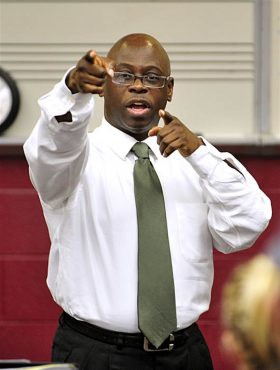It’s a stereotype that persists to this day: Acclaimed African-American choral conductors are usually regarded for only having expertise in the area of gospel music and spirituals. Yet premier conductors, regardless of race, share so much more in common. Gerald Knight, an assistant professor of music, examines those traits in his first book, Two African American Choral Conductors: Eroding Misconceptions Through Excellence.
Published by VDM Verlag, the book is an extension of Knight’s doctoral dissertation. In interviews with renowned choral conductors André Thomas and Judith Willoughby, he draws conclusions that mirror previous research – namely, that great choral conductors are familiar with music of the Western tradition and are themselves musicians extraordinaire.

The book examines the philosophies, choral concepts, and rehearsal strategies used by Thomas and Willoughby, and how these elements illustrate how great conductors attain and apply skills and knowledge that are derived from a set of standards.
Knight then goes a step further
African-American conductors have been acknowledged for having expertise that rivals the best in the profession, he writes, but only as it pertains to spirituals, gospel, jazz and other music by black composers. It’s rare for people to initially assume that Thomas and Willoughby are acclaimed for their work with the Western classical tradition of Beethoven, Bach, Mozart and the like.
Their accomplishments, he concludes, “represent a zenith and a point of departure as their excellence continues to erode the lingering misconceptions about all minorities and women.”
“There is a misconception that African Americans are vaguely familiar with Western classical art traditions and are very familiar with music from their own culture such as gospel and spirituals,” Knight said. “People immediately equate me with a gospel choir when I tell them I’m a conductor.”
The same people know that gospel, spirituals, and jazz are genres that are strongly rooted in black culture, Knight said, and they assume that this is most likely the only music African Americans prefer to identify with, whether it be in their daily lives or in the professional world.
“I’m not offended by it because I understand a little bit about why that occurs,” he said. “We’re trying to change those perceptions.”
Knight earned his doctorate in music education/choral conducting from Florida State University and, before that, a master’s degree and a second bachelor’s degree from the University of South Carolina and a bachelor’s degree from Benedict College. He has also studied at the University of Michigan, The Citadel, Salzburg College in Austria and in the Studio Lirico in Cortona, Italy.
In 2008, Knight traveled to the Goethe Institute in Freiburg, Germany, to study further the German language. In the same summer he also traveled to Salzburg, Austria, where he studied with the renowned opera singer Grace Bumbry, who will be a Kennedy Center honoree in December.

Knight has appeared in concerts and recitals in Europe and throughout the southeastern United States.
Prior to pursuing his doctoral studies, Knight worked as choral director at Alcorn Middle School in Columbia, S.C., and before that as instructor and director of the Morris College Chorale at Morris College in Sumter, S.C.
“The really great thing about Gerald’s book is how he is able to take the master concepts of the two choral conductors he studied and make their ideas accessible to future generations of conductors,” said Thomas Erdmann, a professor of music at Elon. “Conductors of all groups, they need not be of choral groups, will find in Gerald’s book ways they can pattern their own work with young people to … have them find the excellence that is already within them.”
That, Erdmann says, is in addition to Knight’s classroom talent.
“Gerald speaks to students not just from his incredible knowledge base, but from a background that is steeped in his own life experiences as a student, a world-class performer, and a teacher of the highest regard,” he said. “Students can’t help but be swept up in his enthusiasm.”


